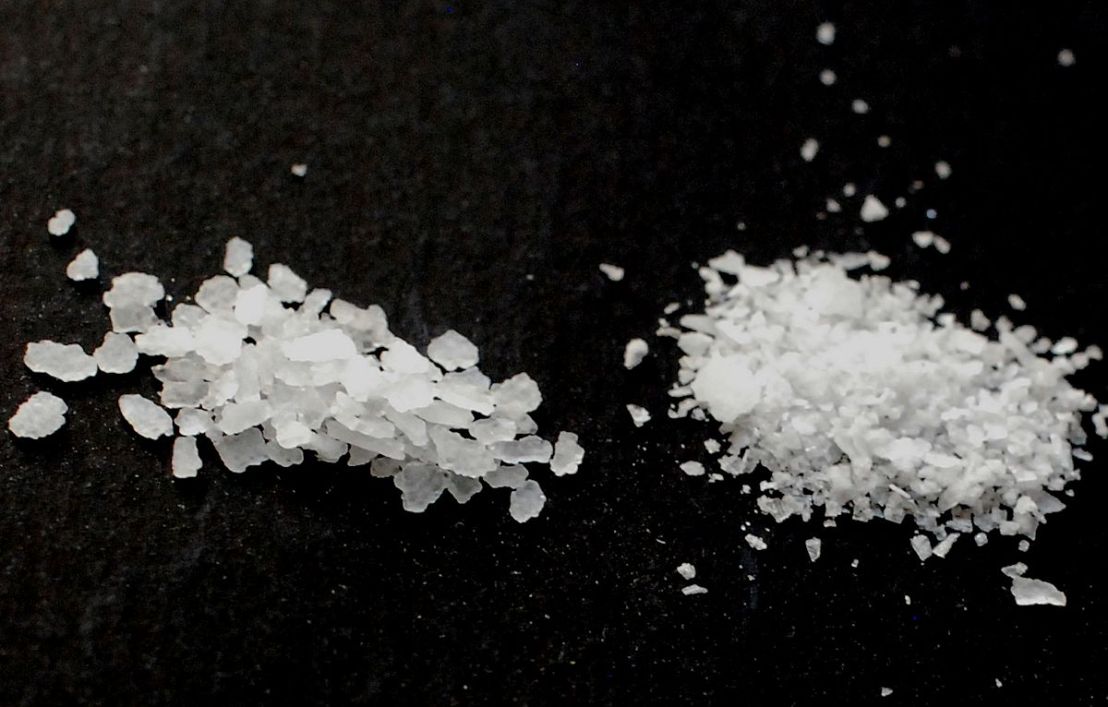
Salt comes in a bewildering number of packages: table, kosher, Maldon, sea and even popcorn. What’s the difference and does it matter? And why use kosher salt? In this article we’ll tell you how these salts are different and how you might use them.
Well, first of all, they are all basically sodium chloride (NaCl) and crystallized in various ways with various numbers of impurities. Salt naturally crystallizes in little cubes, but if you fool around as it is crystallizing you can get slightly differently shaped crystals.
Table salt products usually have anti-caking additives so they will flow smoothly. Morton’s and Diamond both add silicon dioxide (sand), tricalcium phosphate, sodium bicarbonate, dextrose (glucose) and for iodized salt, potassium iodide.
Kosher salt is a larger crystal salt, and while it usually is actually kosher, it is really a salt used in the koshering process, to draw blood from the surface of meat to make the meat kosher. Morton’s kosher salt adds ferrioprussate of soda (sodium ferrocyanide, Na4Fe(CN)6) as an anti-caking agent, but Diamond does not.

Maldon salt is a specialty salt, crystallized to give light, pyramidal crystals that give a nice crunch on roasts and baked goods, but costs nearly ten times as much as conventional salts.
And sea salt is extracted from the sea, purified and crystallized into fair large cubic crystals. Ours came from the Blue Crab Bay Company.

Finally, Hawaiian Red Gold Sea Salt is made much as any other sea salt, but a small amount red clay (Hawaiian red alaea) is mixed in to give the red color.
Himalayan sea salt is mined in Pakistan, where there is enough iron oxide in the minerals included in the salt to give it a pink color.
Oh, and popcorn salt is just finely ground table salt.
Why use kosher salt?
Some recipes specifically call for the addition of kosher salt. And John Barricelli’s excellent Sono Baking Company Cookbook frequently calls for ¼ tsp “coarse salt.” Why is this? Actually, this is just a trick to get you to add a smaller amount of salt in a baking recipe. The authors assume that the larger kosher salt crystals don’t pack as tightly and that the density of kosher salt is less than that of the finer crystalled table salt. Thus, less salt.
We decided to measure this on some common salt products and came up with some surprising results that differed from previous measurements. We measured out a tablespoon of each kind of salt in a deep, rounded tablespoon measure that we could easily level off, and weighed them on a sensitive kitchen scale.
| Table salt | 12 g |
| Diamond kosher salt | 9 g |
| Morton kosher salt | 17 g |
| Maldon salt | 9 g |
| Sea salt | 20 g |
| Hawaii Gold Sea Salt | 17 g |
The big surprise here is that the fairly common Morton’s kosher salt is actually denser than table salt. The crystals are bigger but they pack together quite efficiently. It is nearly twice as dense as the Diamond kosher salt is. This is pretty obvious from the picture, which shows the crystal size differences. To be fair, we’ve had that box of Morton kosher salt for a couple of years, and the crystals may have gotten broken. However, if it happened to us, it would happen to you just as easily. So if you want “just a pinch” of salt, use the Diamond kosher, not the Morton’s kosher. In a lot of cases, this really won’t matter, but there is nothing worse than oversalted foods.

Salt for garnishes
The sea salts are really intended for garnishes, and the Maldon salt has a really nice crunch, although it is kind of pricey (we really like it, though). The sea salt we measured was called Blue Crab Bay Company Sea Salt, and it had nice big crunchy crystals as well. The Hawaiian Red Gold is good on cooked casseroles and pastas, and the red color stands out on a lot of dishes. You could also use the Diamond kosher salt, but we would not recommend the dense Morton kosher salt. Use it in your ice cream maker!

Chefs use Kosher salt because it doesn’t contain the additives that table salt does. These additives really do affect the taste of your food. Yes, Kosher salt is generally coarser than table salt, and when measuring it volumetrically, you must use more than you would otherwise use with table salt. Another advantage touted for Kosher salt is that the coarse texture makes it easier to “feel” when adding a pinch between your fingers and thumb.
LikeLike
“Morton’s KOSHER salt adds ferrioprussate of soda (sodium ferrocyanide, Na4Fe(CN)6) as an anti-caking agent”
LikeLike
Reblogged this on smalltowngirlsbigadventures and commented:
About to bake a paleo banana bread and needed to check up on salt. Like this.
LikeLike
Hola! Quiero preparar mi propia agua alcalina y he leído que debo poner 1/2 cucharadita de sal en un litro de agua filtrada más el jugo de un limón. Pudieran decirme por favor cuál es la sal que tiene más minerales beneficioso para la salud?
Gracias por adelantado
LikeLike
“Alkaline water” seems to be some sort of pseudo-scientific myth. If you add lemon juice to water, it acidifies it.
If you add table salt, it does not change the pH, but does of course add sodium and chloride ions
LikeLike